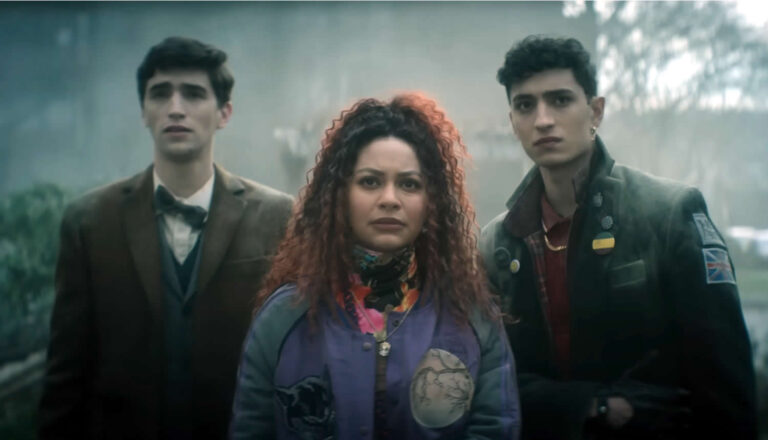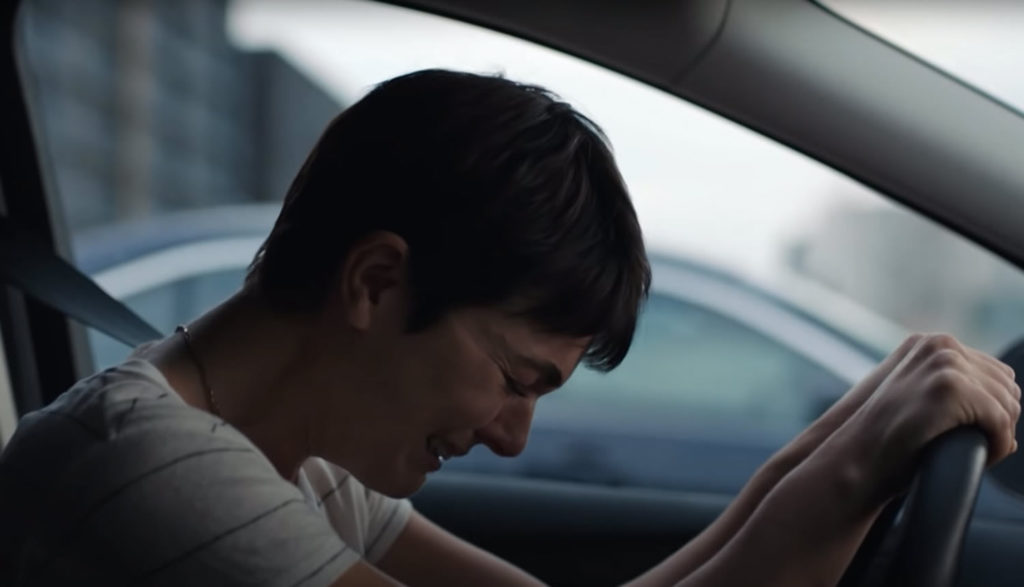
Dead Boy Detectives
Dead Boy Detectives targets teens in style and story. But it comes with very adult, problematic content.

Jenny Cooper believes it’s her job to speak for the dead. And the bodies she sees can be, in a manner of speaking, surprisingly chatty.
Jenny’s a coroner. (You might’ve gathered as much from the show’s name.) It’s up to her to figure out how the corpses in her care died. Was it an accident? Suicide? Murder, perhaps? Why was the victim’s pinkie bruised? What’s that weird coloration around the eye? All these little clues tell a story, and Jenny’s the one who tells it.
But sussing out the truth from dead bodies isn’t an easy job. Especially not for Jenny, who has a difficult story of her own.
Not so long ago, Jenny’s husband died. “He was only 40,” Jenny says.
But her hubby gave Jenny more than a high-school-aged son and a lot of bittersweet memories: He left her a mountain of debt, too. Credit a years-long gambling addiction for that last little gift. Jenny had no idea of the depths of their financial ruin until he died. ’Til debt do you part.
Jenny also has some serious anxiety issues, which she controls through prescription meds and self-help tapes. But even though her job would seem to pile on mountains of stress, she seems most at home—most comfortable, you could say—with the dead.
The coroner notices tiny details most miss. She’ll take on anyone whom she feels is doing the dead a post-mortem injustice. And every time Jenny’s called to investigate a new cadaver, she puts her hand on its head and says a silent prayer, her mouth moving as the detectives watch.
The prayer is a nice touch in a profession that generally lends itself to scientific secularism. (At least on TV, that is.) It’s another way in which Coroner humanizes the character at its heart. Jenny Cooper is flesh and blood, not tissue and formaldehyde. The fact that she has a soul—and believes in one, too—is likely at the heart of this show’s success.
And it was successful long before it made its way to the States. Based on a series of books by M.R. Hall, Coroner first aired in Canada in 2019 (and recently wrapped up its second season there) before it moved to several international markets. In fact, distributor NBCUniversal International Networks says Coroner is its most successful debut ever.
But parent company NBC didn’t pick up the show. Instead, it fell to The CW, home of Riverdale and The 100 and more teen angst than you’ll find in all the high schools in New Hampshire.
Coroner feels more mature than most of CW’s offerings, but that cuts two ways. Sure, we’re dealing with adults here for the most part—and often principled adults at that. But Jenny does more than pray, and her fellow workers do more than work. They drink and swear and sometimes have sex, earning some episodes of this network show a rare TV-MA rating.
And then, of course, there’s Jenny’s work itself—full as it is of corpses, most of which got that way through violent means. We see blood and bruising and, sometimes, mangling. It’s not very pretty.
Jenny knows this quite well. In the first episode, when her teen son is present as some autopsy photos are emailed to her, she shoos him away. “Go,” she says. “Don’t look at them.” Meanwhile, we viewers are encouraged to look—for our own entertainment.
Jenny Cooper begins her new job as a city coroner, and her first assignment is to investigate the apparent double suicide of two teens in a juvenile detention facility. She soon discovers that their deaths are not quite what they appeared to be. In flashback, we also see how Jenny became a widow.
Jenny’s husband dies from an aneurism. He falls into a high school pool, a bit of blood blending with the water. After he’s pulled out, some more blood pools around his head. The two high schoolers who die show signs of distress, too. Both allegedly hung themselves, part of a suicide pact inspired by the play in which they both had starring roles: Romeo and Juliet. As such, the girl has some very serious bruising around her neck. (The boy does, too, but his injuries aren’t as consistent with hanging.) We see bruises around the boy’s wrists as well, and the girl’s foot has a serious abrasion. (Jenny removes some tissue from the corpse for her pathologist to examine.) Jenny inspects another corpse as well. She’s accidentally head-butted once (leading to an apparent but not obvious bloody nose) and is slapped across the face. A teen experiences convulsions. We see a corpse of a man, uncovered and possibly naked, lying on a gurney. (Nothing critical is seen.)
Jenny also inspects a guy who might be a new beau. The two have a drink at a local bar (he drinks beer, she drinks wine). They drive back to her house and have sex in the back of his truck. (We see the two kiss passionately and strip off their shirts; Jenny wraps her legs around the man and the man puts her in the back of the pickup.) The camera leaves shortly thereafter, but returns afterward, filming the two—apparently naked underneath a blanket—talking.
We learn that at least one person involved with the detention center was supplying some teens there with recreational drugs. (We see one youth who’s high, and we learn that one of the victims also had drugs in her system.) Someone brews up those drugs in a basement.
Jenny’s dead husband misled her about the state of their finances. We hear some discussion about suicide and gambling addictions. Someone vomits on a gym floor.
Jenny seems to say a prayer above dead bodies. In flashback, she sees what seems to be a hallucinatory vision of a black dog on the day her husband died, and the animal even licks blood of her husband’s forehead. Characters say the f-word twice (at least in the version we streamed via Amazon) and the s-word three times. The word “a–” is also used. Jenny drinks wine and takes pills, apparently for anxiety.


Paul Asay has been part of the Plugged In staff since 2007, watching and reviewing roughly 15 quintillion movies and television shows. He’s written for a number of other publications, too, including Time, The Washington Post and Christianity Today. The author of several books, Paul loves to find spirituality in unexpected places, including popular entertainment, and he loves all things superhero. His vices include James Bond films, Mountain Dew and terrible B-grade movies. He’s married, has two children and a neurotic dog, runs marathons on occasion and hopes to someday own his own tuxedo. Feel free to follow him on Twitter @AsayPaul.

Dead Boy Detectives targets teens in style and story. But it comes with very adult, problematic content.

An elf mage contemplates on connection and regret as she watches her human friends grow old and pass away.